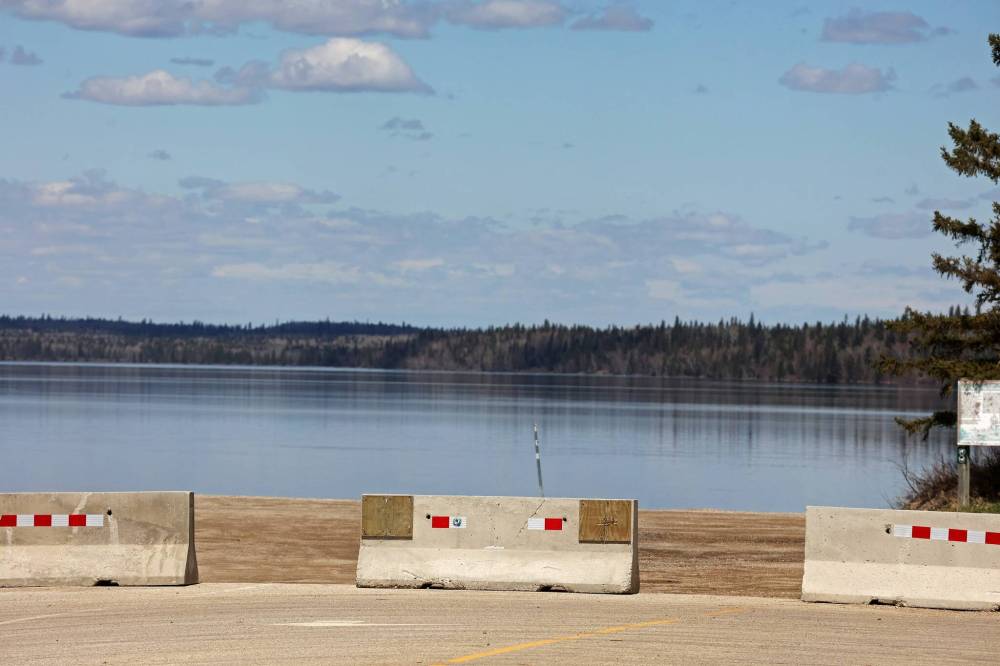The federal government will close Clear Lake to all watercraft this summer in an effort to stop the spread of zebra mussels in southwestern Manitoba.
“Zebra mussels present a real and significant threat to the waters of Riding Mountain National Park and all areas downstream,” said federal Environment Minister Steven Guilbeault in a news release Thursday. “The temporary watercraft management measures in place for Clear Lake in 2024 will provide the best opportunity for Parks Canada and partners to fully assess the situation and protect ecological integrity for future generations.”
Effective immediately, motorized boats, canoes, kayaks, and paddleboards are barred from Clear Lake. Swimming and angling is still permitted.

(Tim Smith/The Brandon Sun)
Concrete barriers block vehicle and boat access to the Wasagaming boat launch at Clear Lake in Riding Mountain National Park on Thursday. The federal government announced it will close the lake to all watercraft this summer in an effort to stop the spread of zebra mussels in southwestern Manitoba.
Manitoba Natural Resources Minister Jamie Moses held a news conference late Thursday to confirm the lake will remain open to swimmers and encouraged Manitobans to enjoy the water, boardwalk and beach this weekend.
“We’re excited that the federal government is willing to at least have things like beach toys on the lake — that the lake will be open for swimming,” Moses told reporters from his office. “I think that comes from some of our advocacy work on behalf of Manitobans.”
Moses said he’s been working to get Guilbeault and Parks Canada to consider other options and to consult more with those impacted at Clear Lake. The provincial minister said he was in Clear Lake two weeks ago to meet with those who’d be affected the most, including businesses at the townsite of Wasagaming and the local chamber of commerce.
“We want our great-great grandchildren to enjoy a clean and healthy Clear Lake.”–Dwayne Blackbird
“I think what we want is to have a very balanced approach — one that sees opportunities for Manitobans to have access to the lake — to be able to use the lake and ensure there are economic activities like tourism at Clear Lake,” said Moses. A “balanced approach” would take the local economic interests into consideration as well as the long-term health and sustainability of the lake, he said.
“I think we could find the balance if there was further consultation with the government but sadly we haven’t seen that.”
There are three exemptions to the no watercraft rule: commercial tour boat the Martese, a vessel from Keeseekoowenin Ojibway First Nation for cultural use, and boats used by Parks Canada for emergency or research needs.
Keeseekoowenin Chief Dwayne Blackbird said he supported the efforts to “give the lake a break” this summer.
“We want our great-great grandchildren to enjoy a clean and healthy Clear Lake,” Blackbird said in a statement.
Zebra mussels were discovered by Parks Canada officials in Clear Lake in November. It said an infestation of the invasive species that can spread by attaching itself to boats could cause irreversible ecological damage to the lake and downstream bodies of water.
THE CANADIAN PRESS FILES
Water testing over the winter did not turn up any zebra mussel environmental DNA.
While water testing over the winter did not turn up any zebra mussel environmental DNA, Parks Canada had said more research and scientific evidence was needed before a decision on closing the lake was made.
Wasagaming averages 300,000 visitors a season, has hundreds of private cabins, a full-service campground, golf course and restaurants, hotels and businesses catering to the swell of tourists.
Moses wouldn’t say if he was disappointed by the decision, instead saying: “What we’ve supported from the start is having a clear communication process on this plan. What we heard from the start is there wasn’t enough consultation from the federal government and Parks Canada.”
He said the province has advocated for Ottawa to support impacted businesses.
“I think we’re going to see some financial package being put out by the federal government,” said Moses. The province is not planning to top up any federal support for local businesses that take a hit from the watercraft ban, he said.
The government is instead beefing up funding to fight invasive species like zebra mussels with $500,000 — a 40 per cent budget increase, the minister said.
It means more washing stations and decontamination stations in Manitoba, some of which will be operational this weekend with parks in the province set to open.
“We’re doing our part as a province,” Moses said. “I encourage Manitobans to do their part as well, to make sure that they clean, drain and dry all watercraft as they enter and exit water bodies in Manitoba — to make sure we’re doing our part to prevent zebra mussels from spreading in Manitoba.”
Clear Lake is 90 kilometres north of Brandon.
carol.sanders@freepress.mb.ca

Carol Sanders
Legislature reporter
After 20 years of reporting on the growing diversity of people calling Manitoba home, Carol moved to the legislature bureau in early 2020.